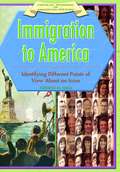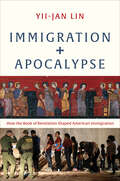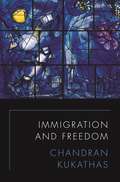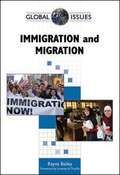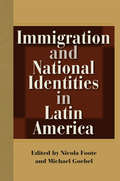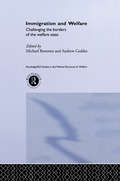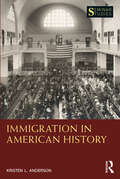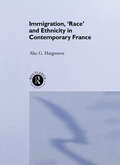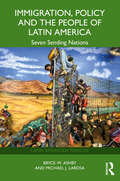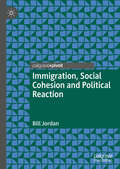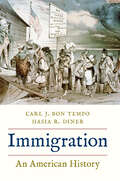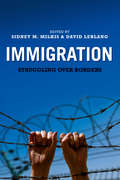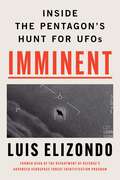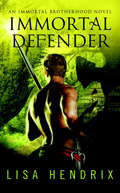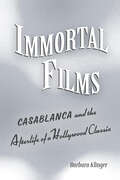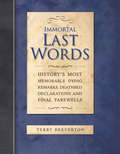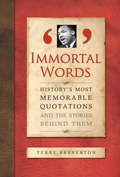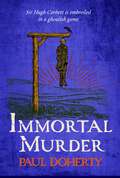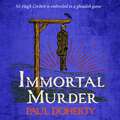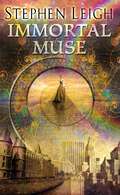- Table View
- List View
Immigration To America: Identifying Different Points Of View About An Issue (Critical Thinking In American History)
by Therese SheaThe integration of narrative and various drills prompts students to learn about different points of view concerning immigration to America. This book discusses the earliest immigrants to America, how different people might have viewed certain documents and historical events differently, and why each immigrant group traveled to the United States to make it its new home.
Immigration and Apocalypse: How the Book of Revelation Shaped American Immigration
by Yii-Jan LinTracing the metaphor of America as the Book of Revelation&’s New Jerusalem, Yii-Jan Lin shows how apocalyptic narratives have been used to exclude unwanted immigrants America appeared on the European horizon at a moment of apocalyptic expectation and ambition. Explorers and colonizers imagined the land to be paradise, the New Jerusalem of the Bible&’s Book of Revelation. This groundbreaking volume explores the conceptualization of America as the New Jerusalem from the time of Columbus to the Puritan colonists, through U.S. expansion, and from the eras of Reagan to Trump. While the metaphor of the New Jerusalem has been useful in portraying a shining, God-blessed refuge with open gates, it has also been used to exclude, attack, and criminalize unwanted peoples. Yii-Jan Lin shows how newspapers, political speeches, sermons, cartoons, and novels throughout American history have used the language of Revelation to define immigrants as God&’s enemies who must be shut out of the gates. This book exposes Revelation&’s apocalyptic logic at work in the history of Chinese exclusion, the association of the unwanted with disease, the contradictions of citizenship laws, and the justification for building a U.S.-Mexico wall like the wall around the New Jerusalem. This book is a fascinating analysis of the religious, biblical, and apocalyptic in American immigration history and a damning narrative that weaves together American religious history, immigration and ethnic studies, and the use of biblical texts and imagery.
Immigration and Citizenship in Japan
by Erin Aeran ChungJapan is currently the only advanced industrial democracy with a fourth-generation immigrant problem. As other industrialized countries face the challenges of incorporating postwar immigrants, Japan continues to struggle with the incorporation of prewar immigrants and their descendants. Whereas others have focused on international norms, domestic institutions, and recent immigration, this book argues that contemporary immigration and citizenship politics in Japan reflect the strategic interaction between state efforts to control immigration and grassroots movements by multi-generational Korean resident activists to gain rights and recognition specifically as permanently settled foreign residents of Japan. Based on in-depth interviews and fieldwork conducted in Tokyo, Kawasaki, and Osaka, this book aims to further our understanding of democratic inclusion in Japan by analyzing how those who are formally excluded from the political process voice their interests and what factors contribute to the effective representation of those interests in public debate and policy.
Immigration and Freedom
by Chandran KukathasA compelling account of the threat immigration control poses to the citizens of free societies Immigration is often seen as a danger to western liberal democracies because it threatens to undermine their fundamental values, most notably freedom and national self-determination. In this book, however, Chandran Kukathas argues that the greater threat comes not from immigration but from immigration control.Kukathas shows that immigration control is not merely about preventing outsiders from moving across borders. It is about controlling what outsiders do once in a society: whether they work, reside, study, set up businesses, or share their lives with others. But controlling outsiders—immigrants or would-be immigrants—requires regulating, monitoring, and sanctioning insiders, those citizens and residents who might otherwise hire, trade with, house, teach, or generally associate with outsiders. The more vigorously immigration control is pursued, the more seriously freedom is diminished. The search for control threatens freedom directly and weakens the values upon which it relies, notably equality and the rule of law. Kukathas demonstrates that the imagined gains from efforts to control immigration are illusory, for they do not promote economic prosperity or social solidarity. Nor does immigration control bring self-determination, since the apparatus of control is an international institutional regime that increases the power of states and their agencies at the expense of citizens. That power includes the authority to determine who is and is not an insider: to define identity itself.Looking at past and current practices across the world, Immigration and Freedom presents a critique of immigration control as an institutional reality, as well as an account of what freedom means—and why it matters.
Immigration and Migration
by Rayna BaileyIn this reference for readers high school level and above, Bailey, a writer and editor, examines the underlying motivations that influence people to leave their countries and the cultural, financial, and social contributions immigrants and migrants offer their adopted countries. He details the difficulties they face dealing with racial bias, assimilation, and illegal immigration, and offers a historical overview. The book also provides an outline of current immigration policy in the United States, Mexico, the Philippines, France, and South Africa; a how-to chapter on researching immigration and migration; a glossary: and a chronology of immigration and migration from pre-history to the present. Annotation ©2008 Book News, Inc., Portland, OR (booknews.com)
Immigration and National Identities in Latin America
by Nicola Foote Micheal Goebal"This groundbreaking study examines the connection between what are arguably the two most distinguishing phenomena of the modern world: the unprecedented surges in global mobility and in the creation of politically bounded spaces and identities."--Jose C. Moya, author of Cousins and Strangers "An excellent collection of studies connecting transnational migration to the construction of national identities. Highly recommended."--Luis Roniger, author of Transnational Politics in Central America "The importance of this collection goes beyond the confines of one geographic region as it offers new insight into the role of migration in the definition and redefinition of nation states everywhere."--Fraser Ottanelli, coeditor of Letters from the Spanish Civil War "This volume has set the standard for future work to follow."--Daniel Masterson, author of The History of Peru Between the mid-nineteenth and mid-twentieth centuries, an influx of Europeans, Asians, and Arabic speakers indelibly changed the face of Latin America. While many studies of this period focus on why the immigrants came to the region, this volume addresses how the newcomers helped construct national identities in the Caribbean, Mexico, Argentina, and Brazil. In these essays, some of the most respected scholars of migration history examine the range of responses--some welcoming, some xenophobic--to the newcomers. They also look at the lasting effects that Jewish, German, Chinese, Italian, and Syrian immigrants had on the economic, sociocultural, and political institutions. These explorations of assimilation, race formation, and transnationalism enrich our understanding not only of migration to Latin America but also of the impact of immigration on the construction of national identity throughout the world. Contributors: Jürgen Buchenau | Jeane DeLaney | Nicola Foote | Michael Goebel | Steven Hyland Jr. | Jeffrey Lesser | Kathleen López | Lara Putnam | Raanan Rein | Stefan Rinke | Frederik Schulze
Immigration and Politics in the New Europe
by Gallya LahavWith almost a quarter of the world's migrants, Europe has been attempting to regulate migration and harmonize immigration policy at the European level. The central dilemma exposed is how liberal democracies can reconcile the need to control the movement of people with the desire to promote open borders, free markets and liberal standards. Gallya Lahav's book traces ten years of public opinion and elite attitudes toward immigration cross-nationally to show how and why increasing EU integration may not necessarily lead to more open immigration outcomes. Empirical evidence reveals that support from both elite and public opinion has led to the adoption of restrictive immigration policies despite the requirements of open borders. Unique in bringing together original data on European legislators and national elites, longitudinal data on public opinion and institutional and policy analyses, this study provides an important insight into the processes of European integration, and globalization more broadly.
Immigration and Welfare: Challenging the Borders of the Welfare State (Routledge Studies In The Political Economy Of The Welfare State Ser.)
by Andrew Geddes Michael BommesImmigration and Welfare avoids simplistic and unhelpful notions of the 'threat' of immigration to analyse the effects of immigration on national welfare states in an integrating Europe. It explores new migration challenges, such as asylum seekers and Europe's increasingly restrictive immigration policies, and looks at the implications of such debat
Immigration in American History (Seminar Studies)
by Kristen L. AndersonImmigration in American History is a concise examination of the experiences of immigrants from the founding of the British colonies through the present day. The most recent scholarship on immigration is integrated into an accessible narrative that embraces the multicultural nature of U.S. immigration history, keeping issues of race and power at the center of the book. Organized chronologically, this book highlights how the migration experience evolved over time and examines the interactions that occurred between different groups of migrants and the native-born. From the first interactions between the Native Americans and English colonizers at Jamestown, to the present-day debates over unauthorized immigration, the book helps students chart the evolution of American attitudes towards immigration and immigration policies and better contextualize present-day debates over immigration. The voices of immigrants are brought to the forefront in a poignant selection of primary source documents, and a glossary and "who’s who" provide students with additional context for the people and concepts featured in the text. This book will be of interest to students and scholars of American immigration history and immigration policy history.
Immigration, 'Race' and Ethnicity in Contemporary France
by Alec HargreavesFirst published in 1995. Routledge is an imprint of Taylor & Francis, an informa company.
Immigration, Policy and the People of Latin America: Seven Sending Nations (Latin American Tópicos)
by Bryce W. Ashby Michael J. LaRosaTaking on historical events in Latin America as its starting point, this book examines the migration of its inhabitants to the United States with case studies from seven nations: Colombia, Cuba, Haiti, Honduras, Guatemala, Mexico, and Venezuela.Combining the disciplines of history and law, the authors explore the economic and historical challenges present in each nation that force "out" migration, including corruption, historical exploitation, racism, unequal/unfair trade arrangements, and the oftentimes unilateral, exploitative operations of multinational corporations. Readers will learn about the contemporary socio/political and economic realities of the seven sending nations and understand the complexity of immigration laws (as passed by the Congress), executive actions taken by individual presidents in the United States, and some state initiatives. They will hear the voices of immigrants themselves, as well as those who have stayed behind or been deported from the United States back to their home nations.This book will be of interest to students of Latin American history, as well as US history and politics.
Immigration, Social Cohesion and Political Reaction
by Bill JordanThis book addresses the challenge for social integration posed by immigration into Western liberal democracies. Movement of people, goods and money across borders has increased in recent decades – the phenomenon known as globalisation. But it has been the migration of refugees from civil wars in the Middle East which has most transformed the political life of European societies, causing the decline in support for the traditional conservative and social democratic parties. It has triggered nationalistic mobilisations and authoritarian regimes, as well as attempts to improved integration in societies. The coronavirus pandemic has added a dimension to these processes, but also opened up new possibilities for transformation.
Immigration: An American History
by Hasia R. Diner Carl J. Bon TempoA sweeping narrative history of American immigration from the colonial period to the present “A masterly historical synthesis, full of wonderful detail and beautifully written, that brings fresh insights to the story of how immigrants were drawn to and settled in America over the centuries.”—Nancy Foner, author of One Quarter of the Nation The history of the United States has been shaped by immigration. Historians Carl J. Bon Tempo and Hasia R. Diner provide a sweeping historical narrative told through the lives and words of the quite ordinary people who did nothing less than make the nation. Drawn from stories spanning the colonial period to the present, Bon Tempo and Diner detail the experiences of people from Europe, Asia, Africa, and the Americas. They explore the many themes of American immigration scholarship, including the contexts and motivations for migration, settlement patterns, work, family, racism, and nativism, against the background of immigration law and policy. Taking a global approach that considers economic and personal factors in both the sending and receiving societies, the authors pay close attention to how immigration has been shaped by the state response to its promises and challenges.
Immigration: Struggling over Borders (Miller Center Studies on the Presidency #Vol. 2)
by Daniel J. Tichenor David A. Martin Anna O. Law Gary FreemanIn an increasingly polarized political environment, the first year of the new president’s term will be especially challenging. With a fresh mandate, however, the first year also offers opportunities that may never come again. The First Year Project is a fascinating initiative by the Miller Center of the University of Virginia that brings together top scholars on the American presidency and experienced officials to explore the first twelve months of past administrations, and draw practical lessons from that history, as we inaugurate a new president in January 2017.This project is the basis for a new series of digital shorts published as Miller Center Studies on the Presidency. Presented as specially priced collections published exclusively in an ebook format, these timely examinations recognize the experiences of past presidents as an invaluable resource that can edify and instruct the incoming president.Contributors: Anno O. Law, Brooklyn College * David A. Martin, University of Virginia * Gary Freeman, University of Texas at Austin * Daniel Tichenor, University of Oregon * David Leblang and Sidney Milkis, University of Virginia
Imminent: Inside the Pentagon's Hunt for UFOs
by Luis ElizondoThe former head of the Pentagon program responsible for the investigation of UFOs—now known as unidentified anomalous phenomena (UAP)—reveals long-hidden secrets with profound implications for not only national security but our understanding of the universe. <P><P> Luis “Lue” Elizondo is a former senior intelligence official and special agent who was recruited into strange and highly sensitive US government program to investigate UAP. To accomplish his mission, Elizondo had to rely on decades of experience gained working some of America’s most classified programs. Even then, he was not prepared for what he would learn, including the truth about the government’s long shadowy involvement in UAP investigations, and the lengths officials would take to keep it a secret. <P><P> For years, Elizondo and his colleagues found themselves on the front lines of what may be the greatest mystery and cover-up in history. Unidentified craft that seem to defy our knowledge of physics**—within air, water, and space—**have been operating with complete impunity since at least World War II. The military, the CIA, and even past presidents have known the truth that humanity is, in fact, not the only intelligent life in the universe. The nonhuman intelligence controlling these UAP are actively conducting surveillance on our most sensitive military installations, and have interfered with ongoing military and nuclear operations. US service members and intelligence officers who have encountered UAP have sustained serious medical injuries. And all of this is happening worldwide. <P><P> The stakes could not be higher. Imminent is a first-hand, revelatory account inside the Pentagon’s most closely guarded secret and a call to action to confront humanity’s greatest existential questions. <p> <b>New York Times Bestseller</b>
Immortal Defender
by Lisa HendrixReturn to the realm of the Immortal Brotherhood with a new paranormal romantic adventure featuring a crew of Viking warriors condemned to live out eternity as were-creatures...In her Defender's strong arms, she has no defense... Part of a band of Viking warriors cursed by an evil sorceress, Torvald has searched for years for a magic that can free him from his fate--to live forever as a were-creature, a man by night, a stallion by day. While studying with the alchemist to Queen Elizabeth, Torvald meets the lovely widow Josian Delamere and hopes she might be the one woman who can save him. Unwilling to give up the independence of her widowhood, Josian expects to become merely lovers, but Torvald's tender seductions make her yearn for more. Just as she's poised to surrender her heart, a hidden enemy reveals Torvald's secret to her--and she flees the dark magic that surrounds him, in fear for her very soul. The proud warrior can win any battle, but he cannot surmount the pain of losing Josian. Yet when her life is threatened, he will risk it all to come to the defense of the one woman who means more to him than his own salvation... Praise for Lisa Hendrix and the Immortal Brotherhood Novels"Lisa Hendrix does Vikings right! I can't get enough of this delicious series!" --Megan Crane, USA Today Bestselling Author of Edge of Obsession"Lisa Hendrix creates a captivating world and an intense romance."--USA Today bestselling author Maisey Yates"A talented storyteller."--Susan Wiggs"Filled with action."--Midwest Book Review"Lisa Hendrix has a great talent and Immortal Outlaw is one book that will have readers riveted."--Fresh Fiction"A sizzling and engrossing romance from the pen of Lisa Hendrix, Immortal Warrior should not be missed."--Romance Reviews Today
Immortal Films: "Casablanca" and the Afterlife of a Hollywood Classic
by Barbara KlingerCasablanca is one of the most celebrated Hollywood films of all time, its iconic romance enshrined in collective memory across generations. Drawing from archival materials, industry trade journals, and cultural commentary, Barbara Klinger explores the history of Casablanca's circulation in the United States from the early 1940s to the present by examining its exhibition via radio, repertory houses, television, and video. By resituating the film in the dynamically changing industrial, technological, and cultural circumstances that have defined its journey over eight decades, Klinger challenges our understanding of its meaning and reputation as both a Hollywood classic and a cult film. Through this single-film survey, Immortal Films proposes a new approach to the study of film history and aesthetics and, more broadly, to cinema itself as a medium in constant interface with other media as a necessary condition of its own public existence and endurance.
Immortal Last Words: History's Most Memorable Quotations and the Stories Behind Them
by Terry BrevertonImmortal Last Words is a fascinating, diverse collection of history's most uplifting, entertaining and thought-provoking dying remarks and final farewells. The 370 entries in this book have been drawn from some of history's greatest statesmen, poets, scientists, novelists and warriors - the eminent men and women who have shaped events over the last four and a half millennia and whose final recorded words have often inspired great deeds or shed light on the nature of the human condition. There are also entries are from less well- known individuals who did not make such an impact on history but whose dying words are equally noteworthy as they encapsulate the spirit of the times or simply reflect the character of the speaker. And finally, the pages of this book contain the last words of some of most ignoble personalities in history - the monsters and maniacs whose final defiant utterances prompt us to reflect on the nature of evil and man's inhumanity to man. Arranged chronologically from antiquity to the present day, each entry is accompanied by contextual information giving a brief biography of the author and an explanation of the circumstances that gave rise to the quotation. Some of the sentiments expressed are unbelievably sad while others are optimistic; some final words have become famous while others have remained obscure, but all reflect the follies and greatness of mankind - its heroes and villains, war and peace and the absolute power of language to change our feelings and challenge our minds. Sample entries include:Buddha 'Strive for your own liberation with diligence'; Vespasian 'Dear me, I believe I am becoming a god'; Thomas Hobbes, 'I am about to take my last voyage, a great leap in the dark'; Robespierre 'Death is the commencement of immortality!'; George Washington'Tis well'; John Keats 'Here lies one whose name was writ in water'; John Maynard Keynes'I should have drunk more champagne'; Salvador Dalí 'I do not believe in my death'; Keith Floyd 'I've not felt this well for ages.'
Immortal Last Words: History's Most Memorable Quotations and the Stories Behind Them
by Terry BrevertonImmortal Last Words is a fascinating, diverse collection of history's most uplifting, entertaining and thought-provoking dying remarks and final farewells. The 370 entries in this book have been drawn from some of history's greatest statesmen, poets, scientists, novelists and warriors - the eminent men and women who have shaped events over the last four and a half millennia and whose final recorded words have often inspired great deeds or shed light on the nature of the human condition. There are also entries are from less well- known individuals who did not make such an impact on history but whose dying words are equally noteworthy as they encapsulate the spirit of the times or simply reflect the character of the speaker. And finally, the pages of this book contain the last words of some of most ignoble personalities in history - the monsters and maniacs whose final defiant utterances prompt us to reflect on the nature of evil and man's inhumanity to man. Arranged chronologically from antiquity to the present day, each entry is accompanied by contextual information giving a brief biography of the author and an explanation of the circumstances that gave rise to the quotation. Some of the sentiments expressed are unbelievably sad while others are optimistic; some final words have become famous while others have remained obscure, but all reflect the follies and greatness of mankind - its heroes and villains, war and peace and the absolute power of language to change our feelings and challenge our minds. Sample entries include:Buddha 'Strive for your own liberation with diligence'; Vespasian 'Dear me, I believe I am becoming a god'; Thomas Hobbes, 'I am about to take my last voyage, a great leap in the dark'; Robespierre 'Death is the commencement of immortality!'; George Washington'Tis well'; John Keats 'Here lies one whose name was writ in water'; John Maynard Keynes'I should have drunk more champagne'; Salvador Dalí 'I do not believe in my death'; Keith Floyd 'I've not felt this well for ages.'
Immortal Last Words: History's Most Memorable Quotations and the Stories Behind Them
by Terry BrevertonImmortal Words is an anthology of history's most memorable, uplifting or thought-provoking quotations from all ages and nations. The texts are drawn not only from the works and words of great writers, thinkers and orators, but also from less well-known sources such as gravestones, book dedications, speeches and political manifestos, letters and diaries, inscriptions and chance remarks. Each of the 370 quotations is accompanied by an extended annotation that tells the story of the speaker or explains the circumstances that gave rise to the quotation. The words and sentiments expressed have been used to encapsulate the human condition, to inspire great works or deeds in times of hardship, or simply reflect the spirit of the time - they will live with you and inspire you day by day, from one year's end to the next. Sample entries include:Marcus Aurelius - 'Nowhere can a man find a quieter or more untroubled retreat than in his own soul …'. Martin Luther King - 'I have a dream …'. John F. Kennedy - 'Ask not, what your country …'. John Gillespie Magee, Royal Air Force pilot, 1941 - 'High Flight'. Ronald Reagan - 'Tear down his wall …'. Isadora Duncan - on her sickbed, writes a feverishly passionate letter to her lover, the actor Gordon Craig. Mother Teresa of Calcutta - 'Life is …'. Colonel Tim Collins of the Royal Irish Regiment, March 19 2003 - 'We come not to conquer …''. Emma Lazarus - 'The New Colossus' (plaque on Statue of Liberty). Joseph Stalin - first broadcast to the Russian people after the German invasion, July 3 1941. Mahatma Gandhi - 'I am a man of peace …'. Abraham Lincoln - on leaving Springfield, Illinois, to take the oath as President. February 11, 1861. Cicero - quoting Cato the Elder, in De Senectute (On Old Age), 44 BC. Charles Lindbergh - describing the last minutes of his pioneering non-stop flight from New York to Paris in 1927. Nelson Mandela - 'I am the First Accused'. Buddha - 'All acts of living creatures become bad by ten things …'. Benjamin Franklin - writes a first draft of his own epitaph. Thomas Jefferson - 'Force cannot change right … Winston Churchill - 'Never in the field of human conflict …'. Adolf Hitler - 'My patience is now at an end'. Edward Everett - President of Harvard on the protest of the student body against the admission of a Negro student. Francis Bacon - 'This world's a bubble; and the life of Man Less than a span …'. Horatio Nelson - 'Separated from all I hold dear in this world …'. Charlotte Cushman - inscription on the curtain of Ford's Opera House, Baltimore. Shakespeare - 'Once more unto the breach …' Henry V. Marie Antoinette - letter to her sister on the day of her execution. Ludwig Van Beethoven - 'I carry my ideas about me for along time, often a very long time…'. Aldous Huxley 1920- 'A million million spermatozoa …'. Eleanor Roosevelt - speaking on the function of hatred in a just cause. Indira Gandhi - 'Women's education is almost more important than the education of boys and men.'
Immortal Murder (Hugh Corbett Mysteries, Book 25): A ghoulish game of medieval murder and mayhem
by Paul DohertyThe twenty-fifth enthralling Hugh Corbett medieval mystery from Paul Doherty, perfect for fans of C. J. Sansom, E. M. Powell and Bernard Cornwell.January 1313. As London is gripped by a freezing winter, Sir Hugh Corbett becomes embroiled in a ghoulish game of kings played out between the English and French courts.Years earlier, Corbett prevented a gang of rifflers from breaking into the Royal Treasury, but the leading chieftain, Sarasin, escaped. Now Sarasin is caught killing a squire of Queen Isabella's and Corbett swiftly has the riffler tried and hanged from the signpost of The Twilight tavern. The matter should have ended there but more mayhem ensues as, one by one, those who helped bring Sarasin to trial are gruesomely murdered. Behind all this is an individual calling himself the Immortal. He swears the most bloody vengeance against Corbett and all those who support the royal clerk, and, as danger dogs Corbett's every footstep, he must act quickly to prevent further bloodshed.What readers say about Paul Doherty:'Paul Doherty's depictions of medieval England are truly outstanding''Another brilliant story in the excellent Hugh Corbett series by a superb historical author''Good plots, clever twists and mostly impossible to work out'
Immortal Murder (Hugh Corbett Mysteries, Book 25): A ghoulish game of medieval murder and mayhem
by Paul DohertyThe twenty-fifth enthralling Hugh Corbett medieval mystery from Paul Doherty, perfect for fans of C. J. Sansom, E. M. Powell and Bernard Cornwell.January 1313. As London is gripped by a freezing winter, Sir Hugh Corbett becomes embroiled in a ghoulish game of kings played out between the English and French courts.Years earlier, Corbett prevented a gang of rifflers from breaking into the Royal Treasury, but the leading chieftain, Sarasin, escaped. Now Sarasin is caught killing a squire of Queen Isabella's and Corbett swiftly has the riffler tried and hanged from the signpost of The Twilight tavern. The matter should have ended there but more mayhem ensues as, one by one, those who helped bring Sarasin to trial are gruesomely murdered. Behind all this is an individual calling himself the Immortal. He swears the most bloody vengeance against Corbett and all those who support the royal clerk, and, as danger dogs Corbett's every footstep, he must act quickly to prevent further bloodshed.What readers say about Paul Doherty:'Paul Doherty's depictions of medieval England are truly outstanding''Another brilliant story in the excellent Hugh Corbett series by a superb historical author''Good plots, clever twists and mostly impossible to work out'
Immortal Murder (Hugh Corbett Mysteries, Book 25): A ghoulish game of medieval murder and mayhem
by Paul DohertyThe twenty-fifth enthralling Hugh Corbett medieval mystery from Paul Doherty, perfect for fans of C. J. Sansom, E. M. Powell and Bernard Cornwell.January 1313. As London is gripped by a freezing winter, Sir Hugh Corbett becomes embroiled in a ghoulish game of kings played out between the English and French courts.Years earlier, Corbett prevented a gang of rifflers from breaking into the Royal Treasury, but the leading chieftain, Sarasin, escaped. Now Sarasin is caught killing a squire of Queen Isabella's and Corbett swiftly has the riffler tried and hanged from the signpost of The Twilight tavern. The matter should have ended there but more mayhem ensues as, one by one, those who helped bring Sarasin to trial are gruesomely murdered. Behind all this is an individual calling himself the Immortal. He swears the most bloody vengeance against Corbett and all those who support the royal clerk, and, as danger dogs Corbett's every footstep, he must act quickly to prevent further bloodshed.What readers say about Paul Doherty:'Paul Doherty's depictions of medieval England are truly outstanding''Another brilliant story in the excellent Hugh Corbett series by a superb historical author''Good plots, clever twists and mostly impossible to work out'
Immortal Muse
by Stephen LeighAn immortal Muse whose very survival depends on the creativity she nurtures within her lovers#133; Another immortal who feeds not on artistry but on pain and torment A chase through time, with two people bound together in enmity and fury#133; Magic and science melded together into one, and an array of the famous and infamous, caught up unawares in an ages-long battle#133; Immortal Muse is a tale that takes the reader on a fascinating journey from Paris of the late 1300s with the alchemists Perenelle and Nicolas Flamel, to contemporary New York City Along the way, there are interludes with Bernini in Rome in 1635; with Vivaldi in Venice of 1737; with Antoine-Laurent de Lavoisier and Robespierre in the Paris of the French Revolution; with William Blake and John Polidori in 1814; with Gustav Klimt in fin de siècle Vienna; with Charlotte Salomon in WWII France And in modern-day New York, a complicated dance of love and violence finally brings a resolution to the centuries-old deadly feud.
